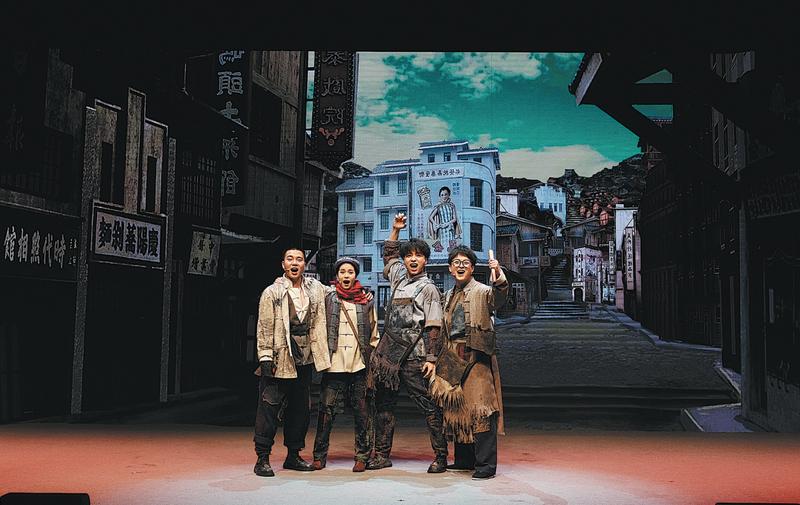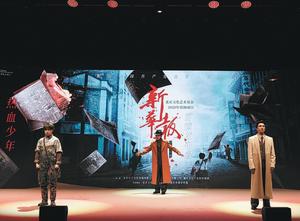New musical honors youth selling newspapers on the streets during troubled times, Chen Nan reports.
 (From left) Teenagers selling newspapers in the musical Xin Hua Bao Tong: Crew Head, played by actor Zhou Zijun, Brother Ninth, played by actress Zhan Jiali, Jiang Yang by actor Li Weipeng and Little Glasses by actor Goljinbuyan. (PHOTO PROVIDED TO CHINA DAILY)
(From left) Teenagers selling newspapers in the musical Xin Hua Bao Tong: Crew Head, played by actor Zhou Zijun, Brother Ninth, played by actress Zhan Jiali, Jiang Yang by actor Li Weipeng and Little Glasses by actor Goljinbuyan. (PHOTO PROVIDED TO CHINA DAILY)
To mark the 100th anniversary of the founding of the Communist Party of China, a new musical Xin Hua Bao Tong, or Newspaper Boy, will premiere on April 30 at the Tianqiao Performing Arts Center in Beijing.
The musical will run through May 2.
Young people also played an important role during the war. Their stories deserve to be known and shared by today’s young people
Jia Ding, songwriter and producer
With veteran songwriter and producer Jia Ding as its artistic director, the musical tells the story of a group of teenagers selling newspapers in Chongqing and doubling up as messengers running through the streets during the War of Resistance Against Japanese Aggression (1931-45).
The musical's main characters are Jiang Yang and Jiang Yu, a young brother and sister pair. The Jiang siblings are orphans trying to make a living by selling newspapers in Chongqing. As they go along their way selling newspapers, they make friends with other teenagers selling newspapers, and journalists working for Xinhua Daily. All of them share mutual goals of fighting aggression and making their own contributions to the country.
Jia, whose real name is Wu Jiading, is a famous director of national galas such as the CCTV Spring Festival gala. Jia says the musical is set in Chongqing because the southwestern city played a critical role during wartime. Xinhua Daily, which was founded by former premier Zhou Enlai in 1938 and later headquartered in Chongqing, was the Party's first official national newspaper. Xinhua was an important newspaper of the Party during the war.
"The city of Chongqing is known for its local cuisine, natural scenery and local lifestyle. It also has a war history," Jia says.
 (From left) Newspaper boy Jiang Yang played by Li, antagonist role played by Wang Zhe, and a Party member by Qi Qi. (PHOTO PROVIDED TO CHINA DAILY)
(From left) Newspaper boy Jiang Yang played by Li, antagonist role played by Wang Zhe, and a Party member by Qi Qi. (PHOTO PROVIDED TO CHINA DAILY)
Japanese warplanes bombed Chongqing from 1938 to 1944, killing and injuring people as well as destroying the city.
"When we visited Chongqing to collect material for the musical, we saw many air-raid shelters built during the war, which have been transformed into restaurants, stores, exhibition halls and even museums to commemorate the people who passed away during the war," Jia says.
The creative team and cast members behind the musical include Jia's young colleagues who are born in the 1980s and 1990s.
They portray the roles of teenagers selling newspapers on the streets of Chongqing. To better connect with the audience, the musical has taken a more contemporary approach with the language use, costumes, and most importantly the music.
"Though the musical tells a story from decades ago, we believe the young audience will find a connection to it because it's a timeless topic about young people pursuing their dreams," says Cao Yu, scriptwriter and producer of the musical. "Like today's young people, those teenagers selling newspapers in Chongqing were full of passion and optimism despite living through the war with poor life circumstances."
He Qi, the musical's songwriter, wrote songs in contemporary music genres such as hip-hop, rock and pop. He writes and produces music for national galas, movies and television dramas.
"The local dialect of Chongqing is very rhythmic, which inspired me to write songs for the musical," He says.
The songwriter also combined the melody of a Chinese song Mai Bao Ge, which was written by Nie Er in 1933, into the musical. The song is popular among Chinese people and is still performed to this day, especially by children's choirs. Nie wrote the song in Shanghai when he saw a little girl selling newspapers on the street.
Jia says he hopes that many young Chinese people of today will be touched by the stories of the youth who were willing to give up their lives for the future of the country.
"Our hard-won peaceful life is created by many martyrs who sacrificed their lives for the country," he says. "Young people also played an important role during the war. Their stories deserve to be known and shared by today's young people."
Contact the writer at chennan@chinadaily.com.cn


